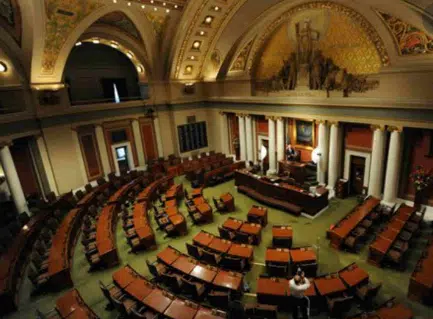
MINNEAPOLIS – The Minnesota House launched into a long, contentious debate Thursday that delayed its first-floor votes on the big-budget bills that lawmakers were unable to pass before time ran out on the year’s regular session last month.
The House had four bills teed up for final floor votes. But minority House Republicans were unhappy with being shut out of the closed-door negotiations between House Democrats and Senate Republicans that shaped them. And they showed it by launching a long filibuster that was expected to last into the night. They also filed about 60 amendments in advance.
“I think we’re going to have a bumpy ride in the Minnesota House,” Democratic House Speaker Melissa Hortman, of Brooklyn Park, said before the debate began. “The House minority is determined to make things take a little bit longer than they need to, but we’ll get it done no matter how long it takes.”
An angry House Minority Leader Kurt Daudt, of Crown, blamed Democrats for disregarding GOP concerns while a narrow group of committee chairs worked out the details in private, and he vowed to vet all of the bills thoroughly on the floor.
“If you don’t think that members of this chamber in this party are willing to stand here and fight for the Minnesotans that you are trying to hurt, you are dead wrong,” Daudt said in an opening speech that lasted over an hour. “Because the battle that we fight here on this floor today is a worthy one.”
The four bills covered the budgets for commerce and energy, agriculture, higher education, and programs funded by the Legacy Amendment, a sales tax increase that voters approved in 2008 to provide extra money for four dedicated funds: clean water, outdoor programs, arts and culture, and parks and trails.
Democratic House Majority Leader Ryan Winkler, of Golden Valley, countered Daudt’s assertions, saying the proposals in the bills got a thorough public airing during the regular session.
“The bills that we are taking up today represent a bipartisan agreement with your Republican colleagues in the Senate — our Republican colleagues in the Senate. It represents an agreement with the executive branch,” Winkler told the chamber. “The only thing standing in the way of this budget getting passed at this point in time is the actions of the minority caucus in the Minnesota House.”




Comments